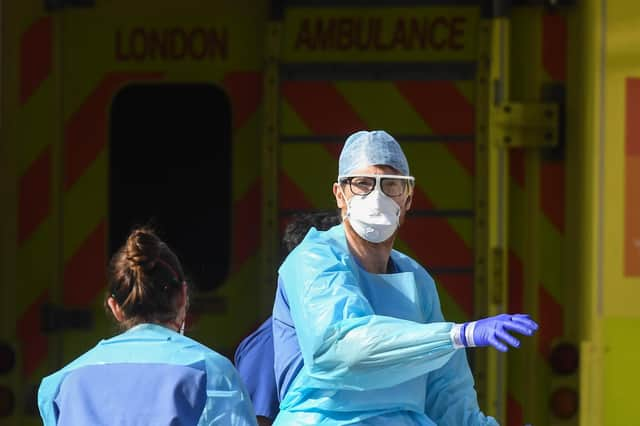The five areas of Doncaster set to suffer most because of coronavirus and the lockdown


Research found 28 so-called left behind neighbourhoods across Yorkshire and the Humber, which were already suffering from pre-existing socio-economic deprivation, were being hit harder by the social, economic, and health impacts of coronavirus.
Measured at a ward level, these areas had high levels of unemployment and worse health outcomes before the pandemic hit, according to analysis from the Oxford Centre for Social Inclusion (OCSI) commissioned by charity Local Trust.
Advertisement
Hide AdAdvertisement
Hide AdAnd using their Covid-19 vulnerability index, which maps out clinical, demographic and social vulnerability, in addition to health inequalities, the 28 Yorkshire wards scored at a much higher 119.3 than the national average of 85.9.
Sign up to our daily newsletter
The areas identified by the study were in Barnsley (Dearne North, Dearne South, Monk Bretton, and St Helens), Rotherham (Maltby, Valley, and Wingfield), Bradford (Tong), Leeds (Middleton Park), Wakefield (Airedale and Ferry Fryston, Hemsworth, Knottingley, Wakefield East, and South Elmsall and South Kirby), Hull (Bransholme East, Bransholme West, Longhill, Marfleet, Orchard Park and Greenwood, St Andrew’s, Southcoates East, and Southcoates West), Doncaster (Adwick le Street and Carcroft, Balby South, Bentley, Mexborough, and Stainforth and Barnby South), and Sheffield (Southey).
In these areas some 9.7 per cent of working age adults were unemployed, compared to 6.5 per cent across England.
And those living there were at greater risk of poor health compared to England as a whole.
Advertisement
Hide AdAdvertisement
Hide AdFor example higher levels of obesity (14.1 per cent to 9.8 per cent) and diabetes (7.8 per cent to 6.8 per cent), as well as lower levels of physical activity - 53.4 per cent of those aged over 16 are physically active in these wards, compared to a national average of 62.5 per cent.
MPs fear that these factors combined mean that, across Yorkshire and the Humber, areas that were already worse off now risk being less well-equipped than the rest of the country to face the economic and social challenges ahead.
And this week an All-Party Parliamentary Group (APPG) was launched to further investigate the underlying issues in these neighbourhoods across the country, where 225 neighbourhoods have been highlighted in total.
Labour Hull North MP Dame Diana Johnson is vice chair of the group and said: “For too long, residents in these neighbourhoods across Yorkshire and the Humber- including in my own constituency - have felt that our political system has both ignored them and left them without a stake in the decisions that directly impact upon their lives and livelihoods.”
Advertisement
Hide AdAdvertisement
Hide AdWhile group member, Conservative MP for Rother Valley Alexander Stafford, said: “'I was elected on the basis of the Prime Minister's pledge to level up the country, and I am utterly committed to doing so by bringing much-needed jobs and investment to Rother Valley.
“Seeing the damage of the pandemic on neighbourhoods already suffering from high levels of socio-economic deprivation, we need to act to ensure that no one feels left behind. As we come out of this difficult period, the APPG will act as key vehicle for representing these areas, both in my constituency and across the region.”
Bradford South MP, Labour’s Judith Cummins, added: “The socio-economic and health impacts of COVID-19 on 'left behind' neighbourhoods, here in Bradford South and across the wider Yorkshire and Humber region, have been hugely significant. We're facing a lost generation with unemployment rising and health inequalities growing ever wider.
“We need to act fast to support these communities and to ensure they receive the necessary resources, as well as the autonomy to act on local priorities. The work of this APPG is going to be vitally important in achieving this.”
Advertisement
Hide AdAdvertisement
Hide AdInitial research suggests organisations in the ‘left behind’ areas, which are often on the outskirts of cities and towns, received less than half the funding per head in Covid-related grants than other deprived areas and around a third of the average levels of England as a whole.
The APPG will examine ways to support these communities to ensure they are more resilient and have better prospects in the future.
Matt Leach, chief executive of Local Trust, the secretariat for the APPG said: “We know from that when the crisis first struck, in many places it was local people who were the first responders, working with community groups, providing vital help to the vulnerable and getting food parcels out to those in needed.
“We can also see that some areas – particularly those lacking places to meet and strong local community organisations to bring them together – missed out; often places already suffering from significant economic and social disadvantage.
Advertisement
Hide AdAdvertisement
Hide Ad“As we move from tackling the health crisis to the challenge of building a strong post-COVID economy, we need to ensure that all communities have the potential to play their part in contributing to that recovery.”